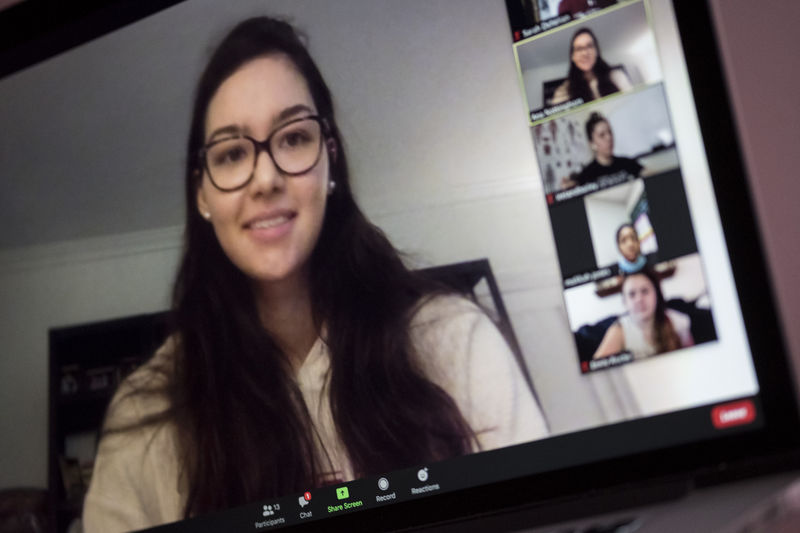Having teachers and support structures in place to ensure that every student has accessibility to the tools necessary to succeed is essential. For students with disabilities, that may mean teachers who have had specialized training or having technology support, something that isn’t always available at even the best of times.
In the eight months since the COVID-19 pandemic began, barriers to educational accessibility for college students with disabilities has been exacerbated exponentially, according to Jeff Rients, Senior Teaching and Learning Specialist at Temple’s Center for the Advancement of Teaching (CAT).
“COVID really is a magnifier for anyone who has any issues in education across a large spectrum. One of the concerns is that some of these students are being left behind in an entirely new way,” he said. “There was research published just this month in the Journal of Intellectual Disability Research. They conducted surveys to families of students with intellectual and developmental disabilities and found that approximately 74 percent of such students in the U.S. lost access to at least one educational resource during COVID. We’re trying to figure out what we can do to address that.”
Through a new OwlCrowd campaign — Accessibility in the Virtual Classroom: Teaching, Tutoring and Mentoring College Students with Disabilities — Temple University Harrisburg in coordination with CAT, the Institute on Disabilities at Temple University (IOD) and Temple University Disability Resources and Services (DRS) is developing resources, including several planned “mini-conferences” designed for the faculty, staff, mentors and families that comprise the support structures that must be in place to ensure that students with disabilities have the same educational opportunities for success.
“Across the country, teacher education at the intersection of online learning and supporting students with disabilities is extremely scarce. Despite the best efforts of CAT, DRS, and IOD, students with disabilities still face educational inequities,” said Rachel Howe, Grant Writer at Temple University Harrisburg. “Parents and support staff have also been struggling to support students at all levels in an online learning environment — nineteen percent of undergraduates report having a disability. In a focus group of college students with disabilities, one of the largest barriers was faculty who were uninformed, non-responsive to, or even pushed back on students’ needs for accommodations.”
Supporting this OwlCrowd campaign, combined with a grant from the Pennsylvania Developmental Disabilities Council, will help provide “best practice” knowledge to “the network of people who support students with disabilities,” said Lindsay Price, Manager of Conferences and Events at Temple University Harrisburg.
“For a lot of professors or instructors, almost all of their training was geared toward in-person instruction. Whether they are capable of meeting the needs of all students in the classroom or not, it’s exacerbated in a virtual environment. The challenge that students face can be anything from lacking a platform to use video capabilities to something as basic as internet access. Some of the challenges that all students face are that much more difficult for students with disabilities,” she said. “I have family who work with children with autism, now virtually, and sometimes it’s harder to reach them — they may not have a home situation that allows them to get those resources or get the access they need. Some students understandably struggle to maintain their attention on virtual instruction for hours a day. We’re trying to find ways overcome obstacles in reaching students remotely that we never had to face before.”
According to Rients, the ultimate goal of the campaign is to “hold an online conference where we are going to provide professional development and educational opportunities in three streams.”
“One stream is for faculty to learn how to provide better educational experiences to the kinds of students we have identified that instructors need more help; making sure these students get their education online. There will be another track for staff to do the same thing and a third track that will be focused on mentoring and families and other interested parties, including the students themselves,” he said. “That same survey data from the Journal of Intellectual Disability Research also asked caregivers and families ‘What do you need?’ and provided a very long list of things that could be done to address these gaps, many of which are completely in line with providing an excellent educational experience to any student.”
Programming will be provided as a series of “mini-conferences,” Price said.
“With it being an online conference, we don’t want to have a full day, or two or three days, of workshops — we recognize that we need to address the struggle of students not being able to sit for eight hours a day in front of a computer. We decided to break it up into a mini-conference series which entails two workshops a day, one day a week for four weeks starting April 7 and continuing April 14, 21 and 28,” she said. “The presentations themselves will be live captioned for ASL and interpretation. We’re also providing accessible documents for those who may need other supportive resources. And what’s great is that this mini-conference is just the beginning of the conversation; ultimately we want to implement some of these practices on an ongoing basis.”
The goal, Rients said, is “for teachers, mentors, families and staff to make substantive changes for the betterment of supporting the students.”
“We’re planning follow-ups to see what changes they’ve implemented and gain an understanding of the topics and concerns we need to revisit in the future. My mind is always on the instructors and their relationship to the students,” he said. “I’m always looking into making instructors into the best instructors they can be; that includes being their best selves for all of their students. You have to always remember to teach to the students you actually have in front of you, whether they are with you in the classroom or connecting to you virtually.”
Make an OwlCrowd donation today to Accessibility in the Virtual Classroom: Teaching, Tutoring and Mentoring College Students with Disabilities at https://giving.temple.edu/accessible.

